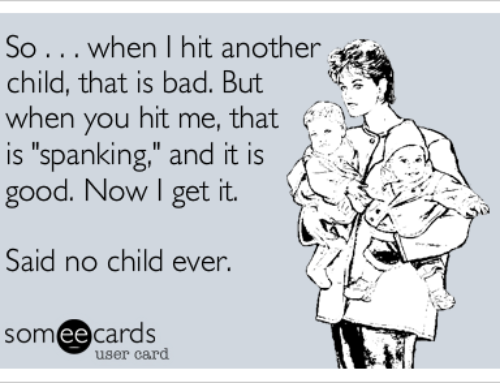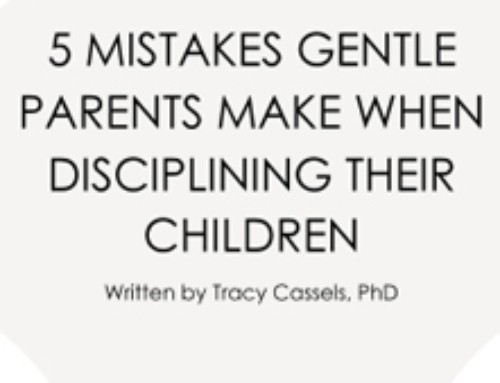
Often we think about expectations in terms of developmental levels, ages, stages, and so on. As we should! These are the cornerstone for our expectations, but there is one that we often fall into that is as inappropriate as it is to expect a toddler to be able to drive: happiness.
If you think about the type of reasoning we often do with our kids when we ask them to do things we want/need them to do, much of it is trying to get them to be happy about the act. Did you ask them to clean up and they don’t want to? Try to cajole them into thinking it’s a good thing (“It’ll look so much nicer”) or suggest they’ll feel better for it (“It’ll be easier for you to find things!”). Does your child not want to have a bath or change a diaper? Same thing, we reason that somehow this is good and they should be happy about it.
But the fact is that they don’t need to be. They can be as miserable out it as you would be being asked to work overtime on your birthday, but it may still need to happen. The problem is that when we set it up as being about happiness, two things happen: first, we approach it all wrong, and second, we send the wrong message.
The Approach
If you want your child to be happy about things, then you go into it cheery and spend your time trying to reason a child into cooperation. It also means you often start out being polite and asking them nicely to do something. Then they refuse and you’re stuck either being respectful and abiding by their answer or continuing on your push, suggesting you don’t actually care what they think. When they continue to refuse, you get frustrated and push and end up forcing things with screaming children and no one is happy at the end.
But what if you just approached it with the knowledge that (a) it needs to be done, and (b) you have no control over how your child will feel about it and however they feel about it is valid? First you wouldn’t ask, you’d let them know what needs doing (and trust me, when you do it this way you become acutely aware if you’re being reasonable or not; when you ask you can think you’re being reasonable when you aren’t).
Second, you’d immediately accept and empathize with the emotions your child has about it. Instead of trying to change how they feel, you can be the one that lets them know it’s okay to feel it and that you will be there to help them through it. You also can then understand the need to go through anger and refusal before acceptance. By letting emotions out without being told they have to stop them, they can move through them and towards where you need them to be emotionally to do what is needed.
Third, by knowing you’re going to go through all of this, you can then leave enough time or provide yourself enough mental space to be with them for however long it takes. Sometimes our frustration comes over time as we feel pressured to get things done right away and thus we reason and push when we really would do better to step back.
Finally, when we realize how hard this is, we do what needs doing to make it fun for our kids. After all, the end goal is to hopefully teach our kids how to tackle these not-so-fun moments in ways that work for them and finding joy whenever possible is one way. Finding meaning is another and as they age that will become more and more relevant (but rarely works at younger ages). The more they get used to doing things without realizing it’s a chore, the easier our lives become as well.
But what about the wrong message the ‘other’ way might be sending our kids?
The Wrong Message
Imagine if every time you felt upset about something, people tried to talk you out of it. Suggested things weren’t that bad, that you were overreacting, or even somehow wrong for feeling the way you were? You can probably do this quite easily because that was likely most of your childhood. You see, most of us grew up with the fear of negative emotions. We were constantly reminded that:
- No one likes someone who is complaining
- You have to learn to suck it up because other’s have it worse
- If you cry, someone may threaten to give you something to actually cry about
- Complaining gets you even more punishment
- And so on
So we hold it in, we hide these emotions and we believe that because they are so bad, the experience of them must speak to us being bad. We’re weak, we’re rude, we’re wrong… Of course, years of this leads to our own inability to handle negative emotions in others because they not only remind us of our own failures, but we can’t help but now see them as weak and rude and wrong.
When we are cognizant enough of our upbringing and the things that may have traumatized or hurt us, we will strive to stop them. For many of us, we learn to avoid these harsher terms that made us feel less than, instead focusing on how it’s not the child that is wrong, but the emotion, and so we reason our way out of it, or at least try to.
Chances are you don’t even mean it this way at all. Chances are, what really has you is the way in which your child is expressing this emotion. But we aren’t very good at being clear about that. So although our children may not feel like they themselves are wrong because we have at least mastered the art of not putting that shit on them, we still can lead them down a path of believing that negativity is wrong and that experiencing these negative emotions is a sign of something wrong. We perpetuate the myth that negative emotions are bad.
Hopefully when we understand that this is the lesson we are teaching, we are better able to cope with these negative emotions and move towards a more empathic way of working with our children. I’m sure some of you really struggled with the thought of just sitting there and letting a child freak out over what seems like a reasonable request to you, but yet, that experience of releasing emotions is necessary. Our role is never to stifle that, but to allow it and then slowly – over years – help guide our children towards ways of expressing these negative emotions in ways that work for everyone. But even that will only happen when they are experiencing distress in a zone which they can handle and we all have areas outside that zone.
For us who have grown up with the discomfort of negative emotions and the idea that we need to be happy all the time, we may need some help coping in these moments or, even better, preparing for them, so let me offer a few suggestions that may work for you:
- Prepare ahead of time. If you can, take a moment to identify those moments that bring you this great frustration or where you hear yourself reasoning to no effect and then plan out how you’re going to say things ahead of time. For example, if you know brushing teeth is a battle, either plan to do it earlier if you think your child is too tired or plan to sit there with a brush awkwardly for 10 minutes while your child gets those emotions out then is ready to face it.
- Perspective-take. As you ask or once you’ve asked, try and think about how your child will or has responded and speak about it out loud. For example, “It’s time to stop playing and clean up the toys before guests get here. I know this is hard to do when you’re having fun and you probably aren’t happy about it and that’s okay. We still need to do it, but you’re allowed to be sad about it.” Saying these things out loud helps your child know you get it and helps you get it too.
- Learn to sit still. Sometimes the emotion is big around these things and we are triggered into needing to respond right away. You don’t need to. You can sit still for a while and allow your child to get those big emotions out. I recommend singing a song in your head, thinking about a list of things you may need to make, or run through some other menial task before speaking. And if you need to speak right away, practice just saying, “I know this is hard and I’m here.” That’s it.
- Mantras are your friend. Certain sayings can be incredibly helpful as a form of self-talk to get us out of the spiral we’re headed down. One of the more commonly helpful ones is, “My child is not giving me a hard time, s/he’s having a hard time.” Having these in mind helps us calm down in these moments and respond more empathically without trying to change how our kids are feeling.
Remember: It takes practice to get here. You won’t get this right away and just as your child needs time to experience the distress and find new ways of expressing it, you need time to experience your failures here and learn from them and move on. I do recommend practicing these things even when it’s not hard because then they will come to you more easily when it is. But whatever you do, try your best not to turn the negative emotions into your child’s enemy.






I think you go too far here. Framing is super important.
Even as a kid, I enjoyed doing my laundry. Everyday life does not have to be bad. Labor is not always suffering, that’s an incredibly counterproductive conception. Life is GOOD.
I also don’t like the whole leave your kid to cry idea either. I agree we shouldn’t force them to not cry, but you act like telling them that the chore is not that bad is some mortal sin. Is it really? A lot of times kids have misconceptions about things.
If a kid doesn’t want to do a chore it’s because he has an incorrect conception of it. How about bringing him along and doing it with him? Without ever labeling it as distasteful? Showing him it’s not that bad.
If you just force him to do it, you turn it into a bad thing and confirm his negative conception of chores, and thus the basic desire to avoid it.
Also, rewards for chores I think is a good thing. It’s incentive rather than coercion. (Funnily enough, a lot of people seem to turn allowance into a coercion tactic: “you miss your allowance if you don’t do all your chores on time”, which totally RUINS it and turns it into a negative, fear-based and sorrow-based thing rather than a good, rewarding, accomplishment thing)
(Rewards worked very very well for me as a kid, at least as I’ve been told. And I’ve been told that when I was very little, I told my mom I no longer needed the little plastic toys as reward for potty training anymore , which is pretty funny, so she started giving me them for other tasks.)
NEEDING to do something is very very negative. WANTING to do something is very very positive, even if it’s for a contrived reward. There’s no stress. There’s no negativity. There’s no drama.
If something really NEEDS to be done, like cleaning up before guests arrive, do it with them. It doesn’t have to be some domination/coercion bullshit which takes far more effort than simply doing the chore with them or yourself.
Also, in your system, what do you do once they’re done crying? How do you FORCE them to do the chore, which is what you seem to be implying is the correct tactic rather than asking? You wouldn’t do that to an adult! You don’t force them to do things RIGHT NOW. You know? They might be in the middle of something! Kids should have the right to say “in a minute”.
I think easing into things is the way to go. If they aren’t picking up their toys, toss them one and tell them to toss it into the box. Like, come on. Or, again, use rewards. It’s a gradual learning process. Also, you don’t want to tell them to do something they’re already going to do themselves, because that’s a surefire way to kill and invalidate the positive initiative they had to accomplish something.
I think everyone’s experienced that last part, I wonder why it feels so bad to be told to do something you were going to do. Probably because it makes you feel like you’re missing out on being able to show you don’t need to be asked.